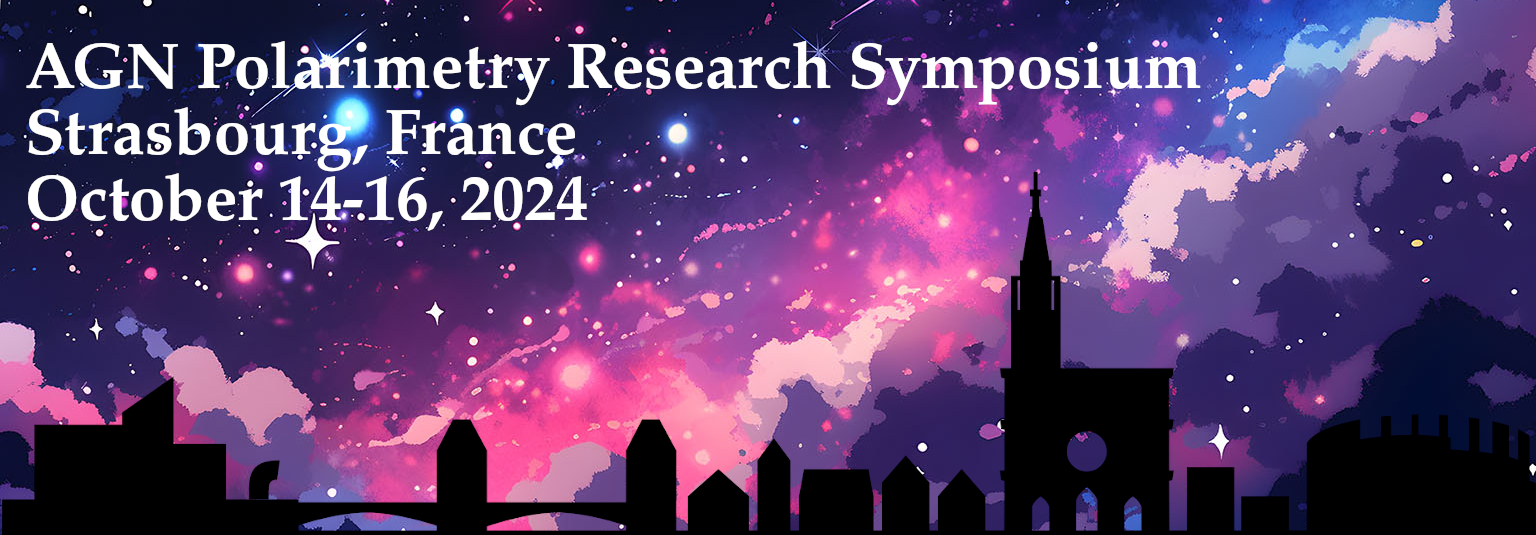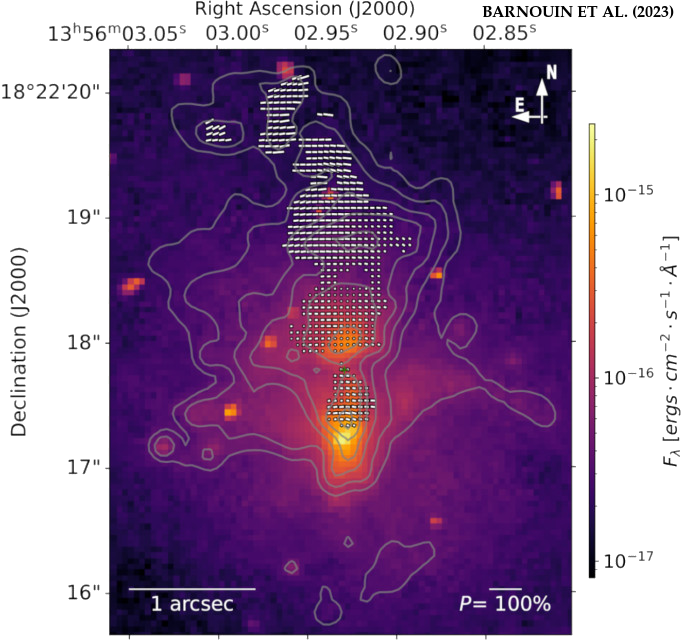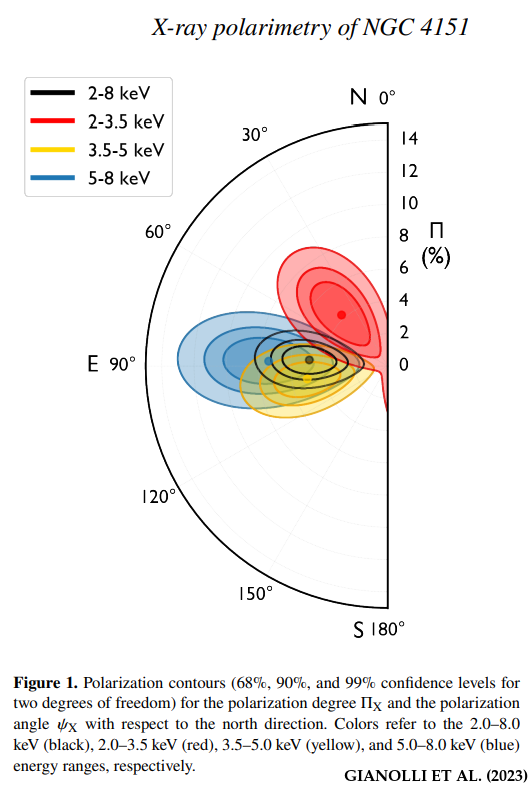


Rational
This workshop will focus on active galactic nuclei (AGN) and their study using polarimetry. The workshop will include around forty people, all experts in the field of AGNs and/or polarization.
The goals of the workshop are to:
- present the latest discoveries on AGNs obtained using polarimetry;
- discuss current simulation tools and community needs;
- highlight the current opened questions on AGNs that polarimetry could help to solve;
- explore the design of future polarimeters to achieve such discoveries.
The idea is to have a short and focused workshop with experts in the fields to drive the forthcoming years of research in extragalactic polarimetry. We also clearly need to constrain the requirements of future polarimetric instrumentation that we could propose to the astronomical community, especially knowing that the next generation of big telescopes and satellites are being designed right now (ELT second wave of instruments, HWO, PRIMA, balloon-borne experiments...). Right now, the future of polarimetry (2030+) is pretty bleak, with the exception of radio band polarimetry.
All attending people are welcomed to present their work and discoveries through oral presentations. It will be possible to bring posters to initiate discussions, but each workshop guest is guaranteed to have an oral presentation. Slots will be allocated for debates and the exchange of ideas in order to best understand the polarimetric needs of the AGN community, keeping in mind their applications to other astronomical sources.
Unlike usual conferences, there are no SOC nor invited presentations, since we are all very knowledgeable in the subject and each of us will have the opportunity to speak. Likewise, there will be no need to go into long introductions to the subject so that we concentrate on the essentials. For this reason, this workshop is truly dedicated to specialists in the field (theoreticians, simulators, observers and instrument designers). Because we want to spark discussion and debate, in the conference room or around a drink, it is an in-person only workshop (although talks will be registered and available to the community later on).
Program
| Time | Session | Talk | Speaker |
|---|---|---|---|
| 08h50 - 09h20 | Arrival, badge, coffee and croissants | ||
| 09h20 - 09h30 | Welcome words | Aims and schedule of the workshop | Frédéric Marin |
| 09h30 - 09h55 | Observations | From local to high redshift: polarimetry as a tool for studying AGN structure | Marko Stalevski |
| 09h55 - 10h20 | Observations | Full-Stokes monitoring of AGN jets at mm and cm wavelengths | Ioannis Myserlis |
| 10h20 - 10h45 | Observations | Results from the last multiwavelength polarization study of the archetypical blazar BL Lacertae | Iván Agudo |
| 10h45 - 11h10 | Observations | A new perspective on radio-quiet AGN through millimeter polarimetry | Elena Shablovinskaya |
| 11h10 - 11h35 | Observations | Using (sub)millimeter spectral line polarization to study magnetism and the AGN | Boy Lankhaar |
| 11h35 - 12h00 | Observations | Infrared polarimetry of galaxies in the local and high-z universe | Enrique Lopez Rodriguez |
| 12h00 - 14h00 | Lunch break | ||
| 14h00 - 14h25 | Observations | Pushing the limits of optical polarimetric monitoring of blazars | Yannis Liodakis |
| 14h25 - 14h50 | Observations | Optical and Radio Polarization Behavior of BL Lacertae during Dramatic Multi-Wavelength Activity in 2020-2023 | Svetlana Jorstad | td>
| 14h50 - 15h15 | Observations | Probing AGN properties with optical (spectro)polarimetry in lines and continuum | Eugene Malygin |
| 15h15 - 15h40 | Observations | Quasi-Peridoc Eruptions in GSN 069 as viewed in polarized light | Beatriz Agís González |
| 15h40 - 16h05 | Coffee break | ||
| 16h05 - 16h30 | Observations | Scattered synchrotron emission and a giant torus revealed in the polarized light of Centaurus A | Frédéric Marin |
| 16h30 - 16h55 | Observations | Polarized subcomponents in the optical emission of blazars revealed with multimodal approach | Dmitry Blinov |
| 16h55 - 17h20 | Observations | Spectropolarimetry of low and high redshift QSO | Alessandro Capetti |
| 17h20 - 17h45 | Observations | Optical spectropolarimetry of a changing look AGN NGC 3516 | Djordje Savic |
| 17h45 - 18h10 | Observations | Reducing archival imaging polarimetry from HST/FOC to prepare the future of UV polarimetry | Thibault Barnouin |
| 18h45 | Social event | A drink in the city center |
| Time | Session | Talk | Speaker |
|---|---|---|---|
| 09h00 - 09h30 | Coffee and croissants | ||
| 9h30 - 9h55 | Observations | The IXPE view of RQ AGN | Giorgio Matt |
| 9h55 - 10h20 | Observations | A Second Look at the X-ray Polarization of NGC 4151 with IXPE | Vittoria Elvezia Gianolli |
| 10h25 - 10h45 | Observations | Photo-polarimetric monitoring program TOP-MAPCAT in the era of multi-wavelength polarization | Jorge Otero-Santos |
| 10h45 - 11h10 | Community discussion | Next targets and scientific questions that observations could sove | |
| 11h10 - 11h35 | Simulations | Spectro-polarimetric AGN torus models with SKIRT | Bert Vander Meulen |
| 11h35 - 12h00 | Simulations | Fully relativistic Monte-Carlo radiative transfer code for spectra and polarization from disk-corona system | Sudeb Ranjan Datta |
| 12h00 - 14h00 | Lunch break | ||
| 14h00 - 14h25 | Simulations | Warm coronas in accreting black holes: from dynamo processes up to radiated spectra (outsider's view) | Jiri Horak |
| 14h25 - 14h50 | Simulations | X-ray Polarization by Reflection from Accretion Discs | Michal Dovciak |
| 14h50 - 15h15 | Simulations | X-ray polarization models: reprocessing in distant components of radio-quiet AGNs | Jakub Podgorny |
| 15h15 - 15h40 | Simulations | The Origin of the X-Ray Polarization in the Circinus Galaxy | Atsushi Tanimoto |
| 15h40 - 16h05 | Coffee break | ||
| 16h05 - 16h30 | Simulations | Effect of gravitational microlensing on the polarisation of multiply imaged quasars | Dominique Sluse |
| 16h30 - 16h55 | Simulations | Decoding Blazar Polarimetry | Lente Dreyer |
| 16h55 - 17h20 | Simulations | Polarization from Turbulence and Shocks in Blazars | Alan Marscher |
| 17h20 - 17h45 | Simulations | Probing Particle Acceleration in Blazars with Multi-Wavelength Polarimetr | Haocheng Zhang |
| 17h45 - 18h10 | Community discussion | What are the needs of the community in terms of simulations? | |
| 19h30 | Social event | Conference diner |
| Time | Session | Talk | Speaker |
|---|---|---|---|
| 9h00 - 9h30 | Coffee and croissants | ||
| 9h30 - 9h55 | Current and future instruments | ALMA polarization observations | Rosita Paladino |
| 9h55 - 10h20 | Current and future instruments | Dust Polarimetry and the PRIMA Far-infrared Probe | Brandon Hensley |
| 10h20 - 10h45 | Current and future instruments | High resolution AGN observations with VLTI/MATISSE | Violeta Gámez Rosas |
| 10h45 - 11h10 | Current and future instruments | The Habitable Worlds Observatory | Chris Packham |
| 11h10 - 11h35 | Current and future instruments | IFU spectro-polarimetry with the FiberPol-6D | Sabyasachi Chattopadhyay |
| 11h35 - 12h00 | Current and future instruments | X-ray polarimetry: IXPE and future | Romana Mikusincova |
| 12h00 - 14h00 | Lunch break | ||
| 14h00 - 14h25 | Current and future instruments | StokeSat - A Small Satellite for Soft X-ray Polarimetry | Yannis Liodakis |
| 14h25 - 14h50 | Current and future instruments | Gamma-Ray Polarimetry with Conversions to e+e- Pairs | Denis Bernard |
| 14h50 - 15h15 | Current and future instruments | Gamma-Ray Polarimetry for AGNs: Possibilities and Requirements | Merlin Kole |
| 15h15 - 16h20 | Community discussion | What should be the next polarimeters? | |
| 16h20 - 16h30 | Closing words | Acknowledgments and summary of the workshop | Frédéric Marin |

